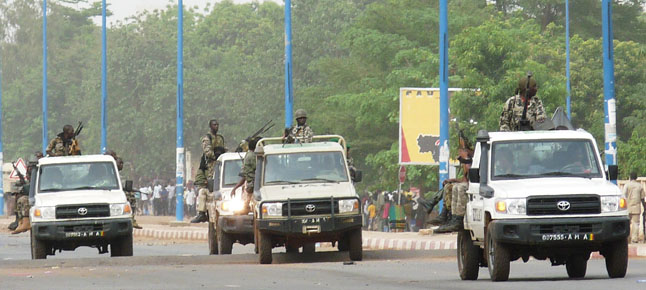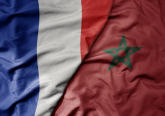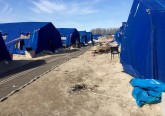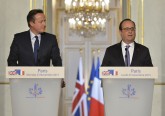
The announcement by French President Francois Hollande that his country is engaged in a military intervention in Mali represents a significant shift in strategy for the former colonial power in Africa. Up until a couple days ago, France was very much the reluctant intervener, investing all of its energy in coordinating a multilateral intervention (led by the Economic Community of West African States, ECOWAS) to forestall the further advance of Islamist forces in the Sahel region, and in reassuring worried African states, such as Algeria, that France’s days as an ‘African policeman’ were long gone.
France’s reticence to intervene has also been a function of the country’s recent departure from Afghanistan, after a significant investment of soldiers and resources. The French were leaving one quagmire, and so were less than eager to enter another.
But the past few days, which saw militant groups take control of the strategic town of Konno, took both regional and international actors by surprise. In April, during the uncertainty that followed the country’s military coup, these armed factions – some linked to al-Qaeda – conquered territory in northern Mali. The move into Konno, however, appeared to threaten the capital city of Bamako only 375 miles further south. There were genuine fears that the weak Malian army would simply crumble in the face of further provocations from rebel forces.
On Tuesday of last week, during a visit to Canada, the head of the African Union suggested that NATO countries should participate in an intervention to stabilize Mali. On the Thursday, as Islamist fighters advanced even closer to government positions, the interim President of Mali implored the French to come to the assistance of his country. Then the Security Council, in an emergency session later the same day, expressed its “grave concern” about the deteriorating humanitarian situation in Mali (where over 400,000 people have been forced the flee the north), and the “urgent” need to address the increased terrorist threat posed by rebel advances. The council also reiterated the request made in its December 2012 resolution: for outside actors to assist the Malian Armed Forces to retake the territory in the north captured by rebels.
These “invitations” to intervene appeared to give President Hollande the legal cover he needed to act. While international lawyers will no doubt argue over whether this is true, accusations of unilateralism will likely ring hollow given that regional players were asking for French involvement, and the UN was claiming that the situation in Mali constituted “a direct threat to international peace and security” (as the current President of the Security Council confirmed today).
More importantly, however, French policy-makers now see themselves as confronting the spectre of further progress by Islamist forces not just in Mali, but also in Africa more generally, and even possibly in Europe. Indeed, TIME magazine is reporting that intelligence sources in Paris claim they have identified aspiring Jihadists leaving France for northern Mali to train and fight. al-Qaeda in Islamic Maghreb (AQIM) has also designated France a prime target for its attacks.
In short, to the French, Mali threatens to become a new Afghanistan: a failed state, and a haven for terrorists. Added to this cocktail is the reality that approximately 6,000 French citizens live in Mali, and that there are currently seven French hostages being held in the country. These facts make it even easier to claim that vital French interests are at stake in a country that is becoming increasingly unstable.
French foreign minister Fabius has therefore articulated three main objectives for the French intervention: 1) To assist the Malian army in stopping the progress of Islamist rebels southward; 2) to protect the “integrity of the Malian state”; and 3) to help rescue French hostages. The time commitment is open-ended; French forces will remain, he said, for as ‘long as is required’. It’s also not completely clear, as I write, what complement of forces is in theatre. French airstrikes have been reported, as have the presence of French Special Forces. But both Fabius and Hollande have been vague on the details of numbers and locations of military personnel (partly out of a desire to protect them).
It was all supposed to work out very differently, with regional actors in the lead. But the crisis in Mali has revealed once again how problematic it is for Western actors to rely on “regional solutions” to regional problems. For several months, ECOWAS had been pushing for an African intervention to address the situation in Mali, which posed regional security threats, given the continued proliferation of weapons and the presence of armed groups with links to terrorist movements. At the UN, Western diplomacy had followed suit, emphasizing the need for a multilateral intervention led by African states, but supported with hardware and training from the outside. As a result, the December 2012 Security Council resolution makes African “ownership” explicit in its authorization of the use of force.
But a variety of factors have made the realization of an African mission difficult to achieve. The first is a capacity problem. As the UN Security Council acknowledged, it would take time to train and equip such a force, particularly for desert conditions, and to engage in the detailed planning necessary to make the mission successful. Thus, the council forecast that the estimated 3,300 troops promised by ECOWAS states would not arrive in theatre for several months –more precisely, September 2013).
Second, regional solutions inevitably bring into play regional rivalries. In this case, Algeria – the most powerful military force in the immediate region – has been wary of having troops from ECOWAS (an organization to which it does not belong) at its border. This fear is particularly pronounced with respect to Nigeria, a country perceived as one of Africa’s “hegemons”. (Interestingly, today’s announcement by Hollande was accompanied by reports that some Nigerian forces are also in Mali.)
Finally, the Malian army itself has been lukewarm about being on the receiving end of support from its African neighbours, given the involvement of ECOWAS troops in human rights abuses in previous missions in Liberia and Sierra Leone. Human Rights Watch reports claim that while West African forces helped restore security in these crises, which took place over a decade ago, they were also complicit in serious violations of international humanitarian law, including looting, harassment, and arbitrary detention of civilians, as well as – in the case of Sierra Leone – summary executions of suspected rebels.
These factors illustrate that while regional organizations are often touted as the legitimate and preferred actors in crises such as Mali, they cannot always fulfill their mandate. Capacity and politics can get in the way.
And so the buck passes back to reluctant Western actors. Up until the events of last week, the U.S. was urging restraint, rather than the military action called for by the French. America insisted that new elections and the creation of a legitimate government in Bamako should come before any deployment of troops – especially Western troops. Events appear to have forced Hollande’s hand, but in launching today’s intervention, he is asking his armed forces, just returned from Afghanistan, to take a big gamble. After only one day, French assistance has helped the Malian Army re-take Konno from the Islamist forces. But the country’s terrain, the fractured nature of Malian politics, and the unintended consequences that always flow from the use of force, all make this intervention a risky proposition. Moreover, a French presence in Mali could internationalize the conflict among global jihadists, which could be exactly the outcome they seek.
Jennifer Welsh is Professor in International Relations, University of Oxford and Co-editor (with Vaughan Lowe, Adam Roberts, and Dominik Zaum) of The United Nations Security Council and War: The Evolution of Thought and Practice since 1945, (Oxford University Press, 2008) and (with Ngaire Woods) of Exporting Good Governance: Temptations and Challenges in Canada’s Aid Program (Wilfred Laurier University Press, 2007).
This post originally appeared on opencanada.org, the website of the Canadian International Council. It is re-published here with the permission of the author.








No Comment